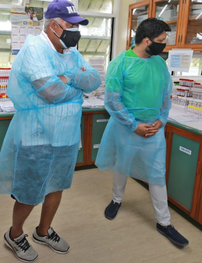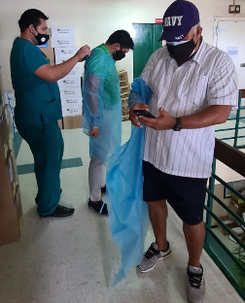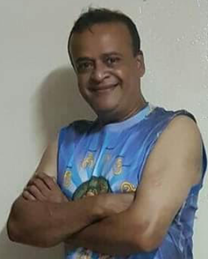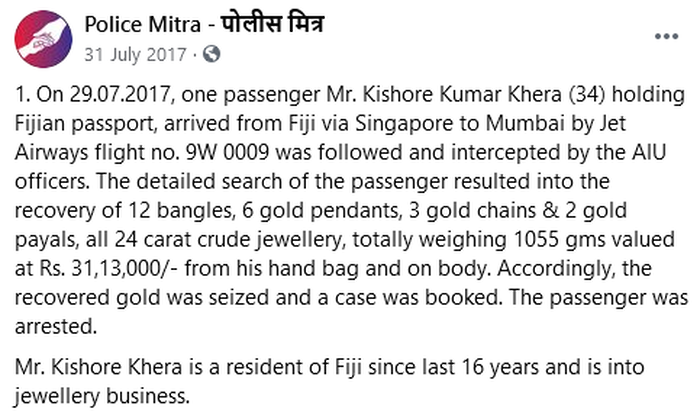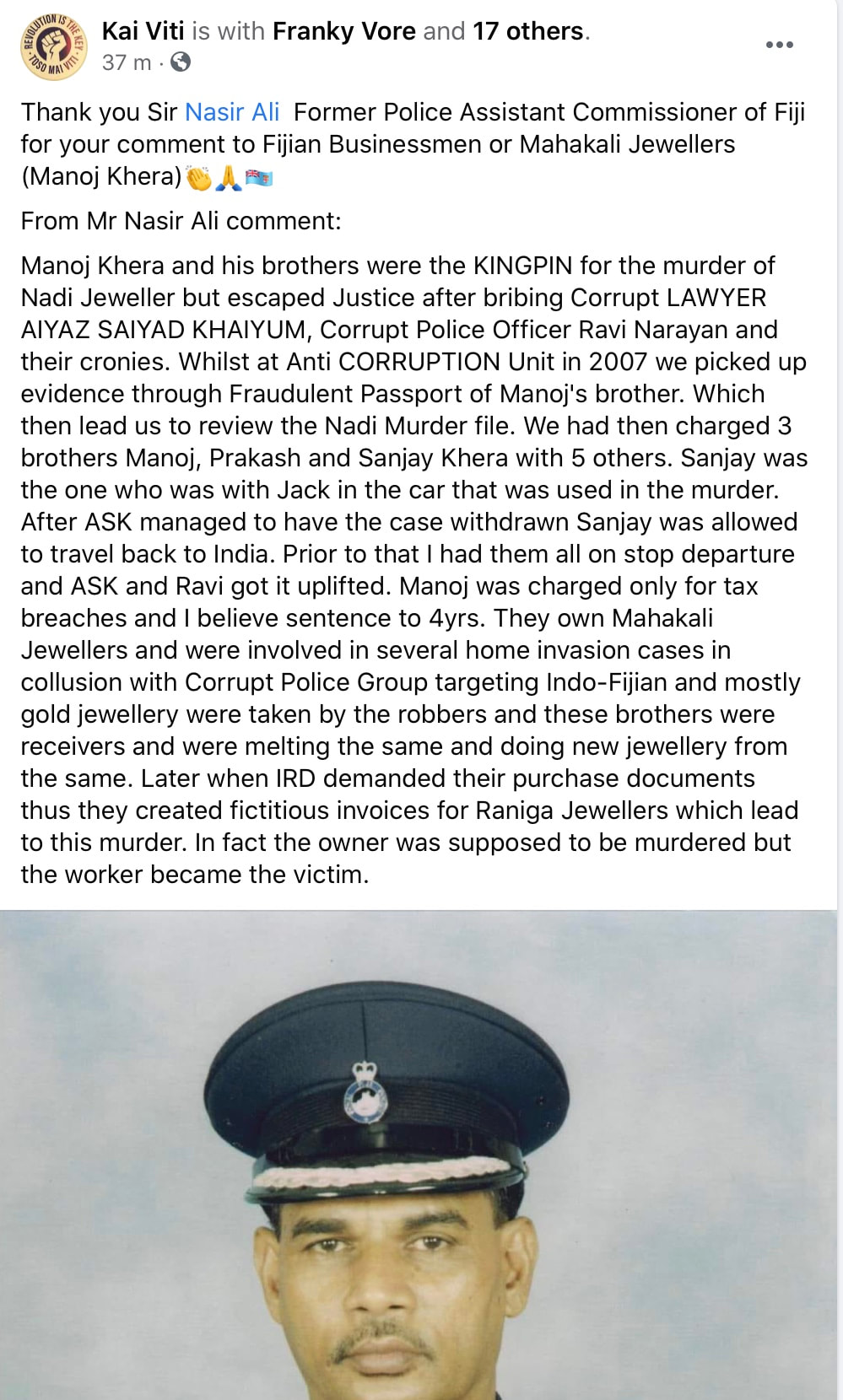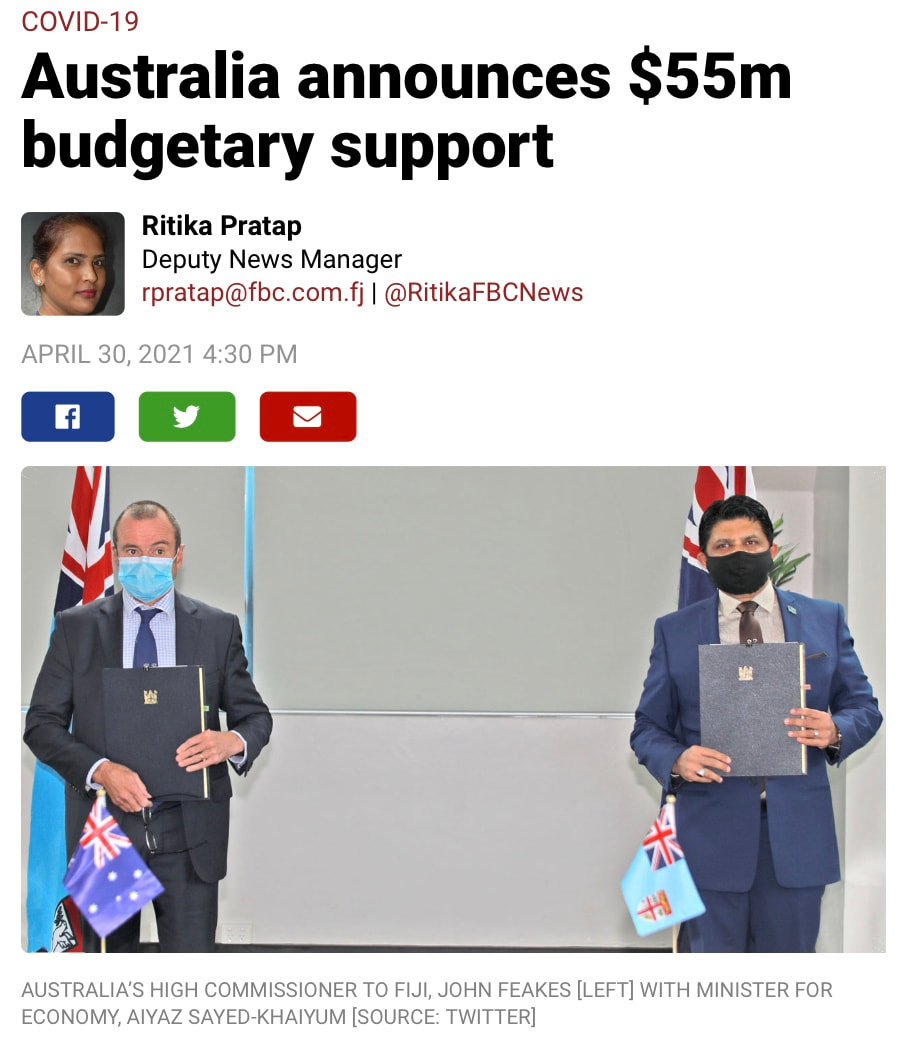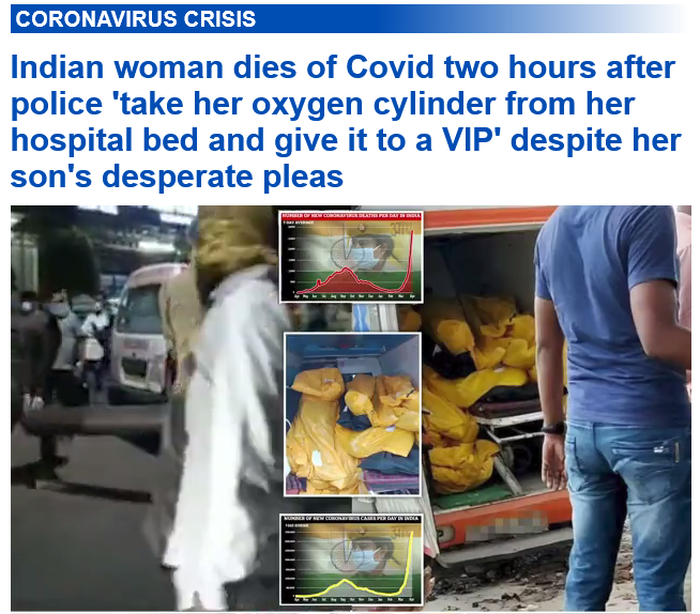Questions for Singapore and Fiji Airways:
* When did the Kheras (Kishore Kumar and his uncle Ratilal Kumar Khera) fly into Singapore?
* Were they in quarantine before boarding flight FJ1362?
* Or were they held in transit lounge for the 9 April flight?
* When did they purchase their airline tickets?
There are allegations that the Kheras forged their Covid-19 free certificates to fly from India to Singapore to Fiji. The two returned positive test results during routine testing while undergoing the 14-day quarantine in Nadi. They were transferred to the isolation ward at Lautoka hospital
* Health Secretary Dr James Fong claimed that the Fijian soldier who contracted COVID-19 in border quarantine in Nadi may have handled the baggage of two passengers from India. Fong didn't identify the KHERAS. The soldier passed on the virus to the woman sent to clean the room for the Kheras - Kishore and Ratilal Khera
SINGAPORE CONNECTION:
* On 29 July 2017, Indian born jeweller Kishore Kumar Khera (KKK), then 34, and holding Fijian passport, arrived from Fiji via Singapore to Mumbai by Jet Airways flight no. 9W 0009. He was arrested by Indian Customs Officials for trying to smuggle $F85,000 worth of jewellery.
* Four years later, on 9 April 2021, he was on the same 10 hour long Fiji Airways flight FJ1362 as Aiyaz Khaiyum that landed in Fiji on 10 April. Kishore Khera is now recovering from COVID at the Lautoka hospital.
His fellow passenger KHAIYUM, on the other hand, is now running around "tackling" Indian Covid in Fiji.
* On 17 April, Dr James Fong revealed that two new cases were a 69-year-old male and a 38-year-old male, who are family members that travelled to Fiji from Rajkot, India, arriving in Nadi on flight FJ1362 from Singapore on April 10 this year.
* The two persons returned positive test results during routine testing while undergoing the 14-day quarantine in Nadi. They were transferred to the isolation ward at Lautoka hospital.
* Fijileaks: The 38-year-old was the jewellery smuggler Kishore Kumar Khera, and the 69-year-old was his uncle Ratilal Kumar Khera, who returned from a funeral in India.
* Who permitted them to travel to India when that country is fighting the deadly Covid 19 variant?
* Dr Fong also claimed that the soldier who contracted COVID-19 in border quarantine in Nadi may have handled the baggage of two passengers from India. Fong didn't identify the KHERAS. The soldier passed on the virus to the woman sent to clean the room for the Kheras:
“That means when he was carrying their baggage down, he had his appropriate PPE on but we feel that was the most likely area of the touchpoint, based on the fact that he was able to transmit it to somebody else. It had to be harbored for a few days and then transmitted. The next touchpoint was the lady who was cleaning the room and getting the room ready and he walked in to put his stuff in the room and he stayed there for a bit of time and that’s the interaction. Because it’s a contained space we believe ."
*Fong said the contact between these two individuals was a breach and should have been reported, and the woman should have gone into quarantine immediately.
* Singapore must seriously review its flight route to Fiji.
We call on Dr Fong to repeatedly test the Khaiyums for Covid
WHO BROUGHT THE VIRUS INTO FIJI?
* In July 2017, the Air Intelligence Unit (AIU) of the Mumbai Customs in India had intercepted Fiji national Kishore Kumar Khera and his personal search resulted in recovery of 12 bangles, six gold pendants, three chains and two anklets totally weighing 1,055 grams of gold valued at Rs 31.13 lakh. He had them in his hand bag and stacked also on his body. The haul was worth $F85,000
* Another Khera, MANOJ KUMAR KHERA, was jailed for FOUR years in Fiji for swindling Fiji Revenue and Customs Authority (FRCA). In 2014, he was convicted on four counts of false pretences and one count of money laundering. He was sentenced to two years imprisonment on each count of false pretences and four years on one count of money laundering, to be served concurrently. The total sentence was four years with a non-parole period of three years. Khera was found to have falsified four invoices between January to April 2004 in order to inflate VAT in its input column, and falsely obtained $44,611.82 in VAT refunds from FRCA which he was not entitled to.
* During his time in prison, he received special favours from Khaiyum via Prison Commissioner and convicted murderer FRANCIS KEAN which included home weekend visits.
* The KHERAS own MAHAKALI JEWELLERS and are close to FFP. They are trading as Shivam Jewellers Ltd. We suspect one K. Kumar is none other than Kishore Kumar (Khera) who donated $10,000 to FFP
"That the Plaintiff [MANOJ KUMAR KHERA] is the son of Amarsi Maganlal Garana (“Maganlal”) who in the early 1980s was working with Lords Jewelers in Fiji. His father Maganlal began his own jewelry business in the name of Mahakali Jewelers in 1991 in Nadi. The business over the years eventually grew to five(5) outlets in locati ons including Nausori, Nadi, Ba and Lautoka. Later operation of Mahakali Jewelers was ceased and began trading as Shivam Import and Exports which was later registered as a limited liability company by the name of Shivam Imports and Exports Limited"
,
,
FIJI 2007: The Kheras, Immigration and Passport Scams
Following an investigation of corruption in the Fiji Immigration Department, the Fiji Independent Commission against Corruption (FICAC) laid charges against travel agent Alvin Raj, Indian nationals Manoj Khera, Prakash Garana, Kishore Khera and Sanjay Khera and immigration officials Uday Kumar Nath and Eroni Tuberi in connection with an alleged passport scam.The Suva Magistrate’s Court adjourned the case repeatedly between June 2007 and February 2008, and reports indicate that the court case was derailed over time as a result of developments in a related murder case. All seven defendants were “discharged” by the court on 19 February 2008. There is no indication that a finding of guilt or innocence was ever made. The Indian nationals – Sanjay Khera, Manoj Khera, Kishore Khera (three brothers) and Prakash Garana – “were charged with conspiracy to make false declaration[s] in order to obtain a passport, giving false information to a public servant and giving false information to FICAC officers”.
MURDER: In February 2008, the brothers were acquitted for the alleged murder of jeweller KAMLESH NANDA, who had been found stabbed to death 20 months earlier. The chief investigator for FICAC said that FICAC officers had “stumbled on fresh evidence” regarding the murder while investigating corruption at the Immigration Department. In August 2007 the defendants in the murder case challenged FICAC in the High Court on constitutional grounds, claiming FICAC did not have jurisdiction to try criminal cases (Khera & Ors vs FICAC). The Court found in favour of the applicants and held that “the institution of criminal proceedings by parties other than the Director of Public Prosecutions was illegal”. The judge returned the case to the Magistrate’s Court. After the ruling, FICAC did not attend court proceedings for either the murder or passport scam case, and in October 2007 passed both files to the Office of the Director for Public Prosecutions (DPP). In spite of the decision in Khera & Ors vs FICAC, magistrates hearing the passport scam case continued to expect FICAC to prosecute the case. In November 2007 a magistrate lifted the bail conditions of those charged in the passport scam and deferred the case to 19 February 2008 because FICAC failed to appear. A FICAC spokesperson argued that the case was “out of [our] hands”, but the same thing happened again on 19 February 2008, when another magistrate “discharged” all seven defendants because FICAC had not appeared in court. FICAC repeated that it did not have carriage of the case. The murder case against the Indian nationals was dismissed under similar circumstances on 19 February 2008. Sources offer no explanations for the confusion surrounding which agency – FICAC or the DPP – was responsible for prosecuting the cases, nor do they comment on the apparent non-appearance of the DPP at court proceedings: Australian Government Refugee Review Tribunal, 11 March 2010
MURDER: In February 2008, the brothers were acquitted for the alleged murder of jeweller KAMLESH NANDA, who had been found stabbed to death 20 months earlier. The chief investigator for FICAC said that FICAC officers had “stumbled on fresh evidence” regarding the murder while investigating corruption at the Immigration Department. In August 2007 the defendants in the murder case challenged FICAC in the High Court on constitutional grounds, claiming FICAC did not have jurisdiction to try criminal cases (Khera & Ors vs FICAC). The Court found in favour of the applicants and held that “the institution of criminal proceedings by parties other than the Director of Public Prosecutions was illegal”. The judge returned the case to the Magistrate’s Court. After the ruling, FICAC did not attend court proceedings for either the murder or passport scam case, and in October 2007 passed both files to the Office of the Director for Public Prosecutions (DPP). In spite of the decision in Khera & Ors vs FICAC, magistrates hearing the passport scam case continued to expect FICAC to prosecute the case. In November 2007 a magistrate lifted the bail conditions of those charged in the passport scam and deferred the case to 19 February 2008 because FICAC failed to appear. A FICAC spokesperson argued that the case was “out of [our] hands”, but the same thing happened again on 19 February 2008, when another magistrate “discharged” all seven defendants because FICAC had not appeared in court. FICAC repeated that it did not have carriage of the case. The murder case against the Indian nationals was dismissed under similar circumstances on 19 February 2008. Sources offer no explanations for the confusion surrounding which agency – FICAC or the DPP – was responsible for prosecuting the cases, nor do they comment on the apparent non-appearance of the DPP at court proceedings: Australian Government Refugee Review Tribunal, 11 March 2010



